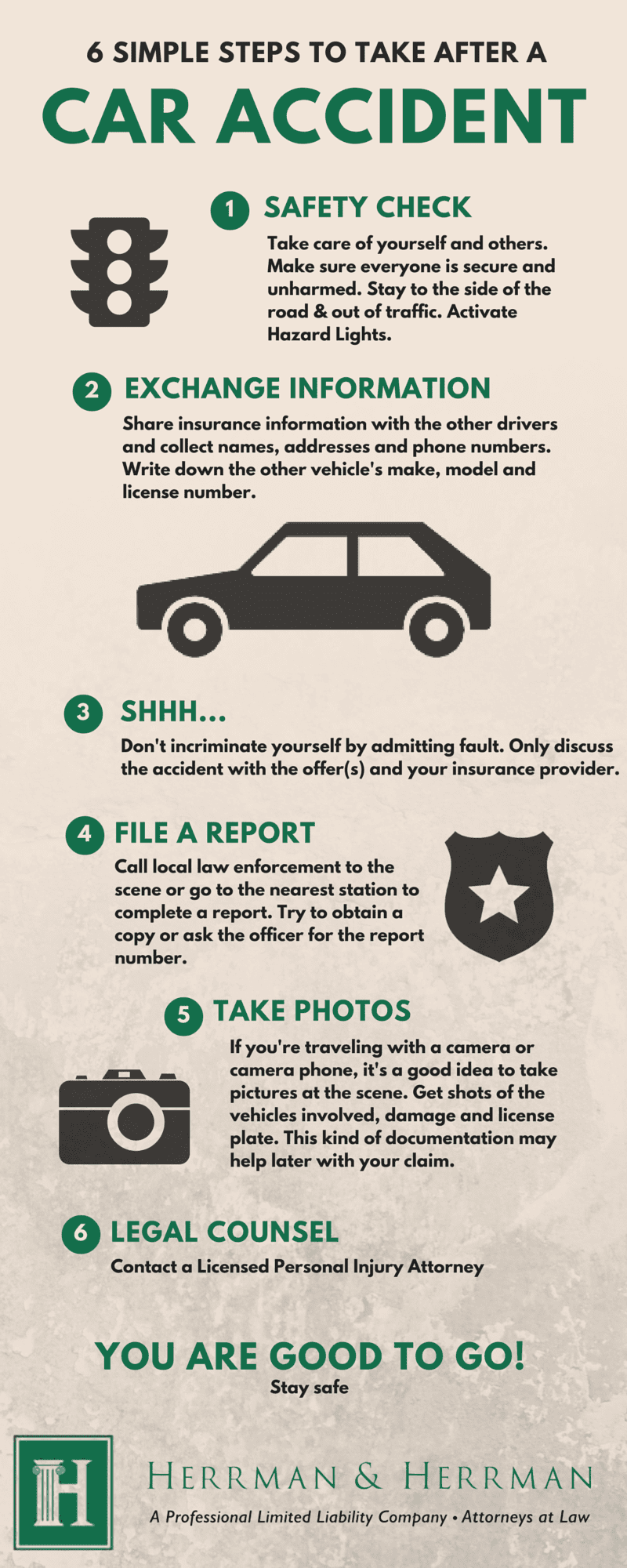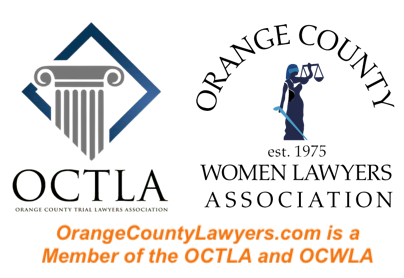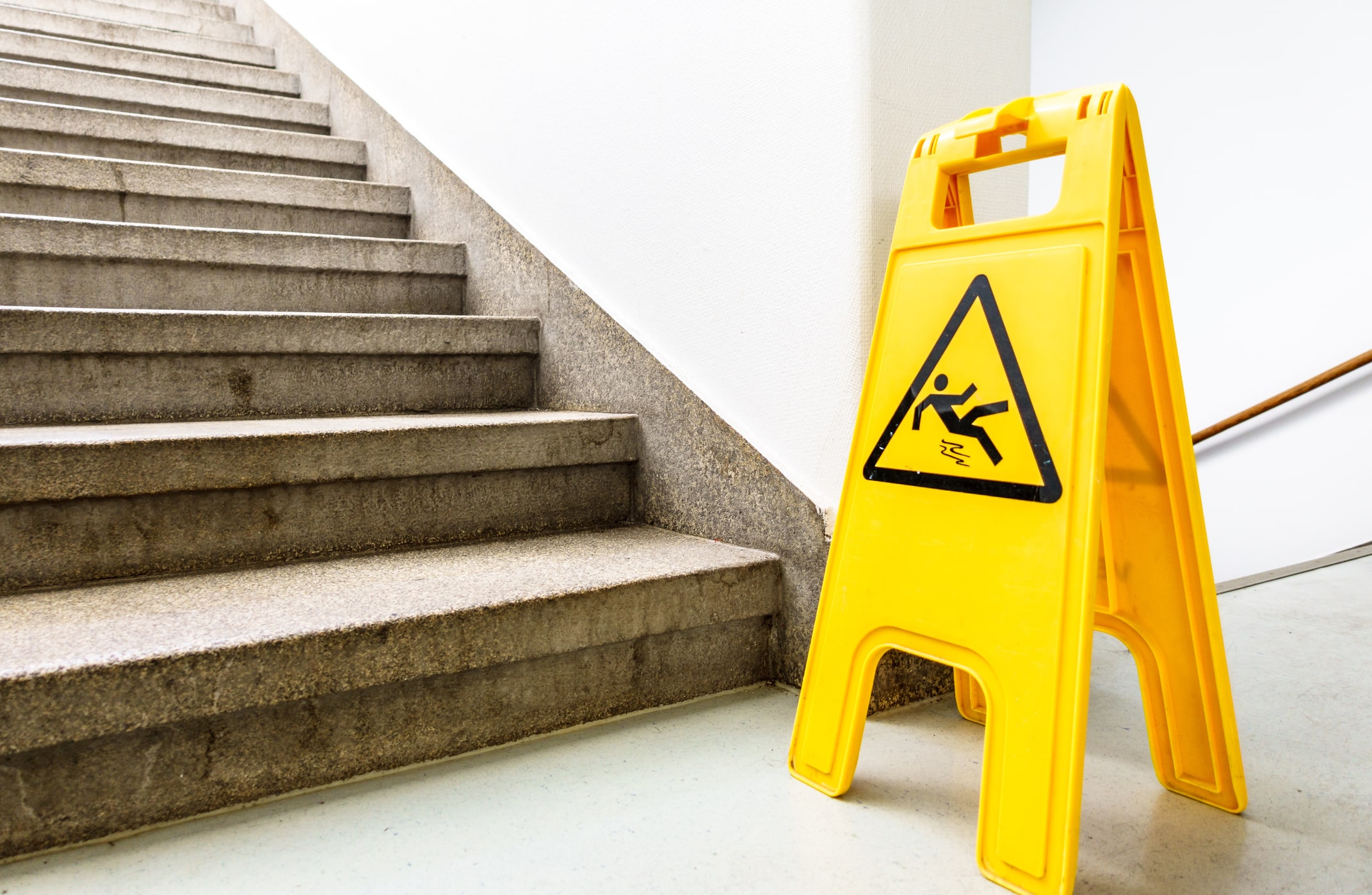I Was in a Car Accident: What Do I Do?
After a car accident, your mind is likely racing, and you may be feeling scared, confused, and unsure of what to do. Panicking will only cloud your judgment. Remember to keep calm, breathe deeply and follow these steps to ensure your safety and protect your rights:
Gather Your Wits
In the aftermath of a car accident, it’s imperative to remain composed and take immediate action to ensure your well-being and safeguard your legal interests. Panicking will only cloud your judgment and hinder your ability to make sound decisions. Remember, staying calm and collected is paramount in these trying circumstances.
-
Stay Calm and Assess the Situation: Remain composed and take a moment to gather your thoughts. Check yourself for injuries, then check on your passengers and anyone else involved in the accident. If you or anyone else is seriously injured, call 911 immediately.
-
Move to Safety: If possible, move your vehicle to a safe location off the road. This will help prevent further accidents and allow emergency vehicles to reach you quickly. If you’re unable to move your vehicle, stay inside with your seatbelt fastened until help arrives.
-
Exchange Information: Once you’ve ensured everyone’s safety, exchange information with the other driver(s) involved. This includes your name, address, phone number, insurance information, and license numbers.
-
Take Photos: If possible, take pictures of the accident scene, including damage to the vehicles, skid marks, and any visible injuries. This documentation can be invaluable for insurance purposes and legal proceedings.
-
Report the Accident: Even if there are no injuries, it’s important to report the accident to the police. They will create an official report that can be helpful for insurance claims and legal matters.
-
Contact Your Insurance Company: Notify your insurance company about the accident as soon as possible. They will guide you through the claims process and help you get your vehicle repaired or replaced.
-
Seek Medical Attention: Even if you don’t feel injured, it’s important to see a doctor to rule out any hidden injuries. Some injuries, such as whiplash, may not show up immediately.
-
Protect Your Legal Rights: If you’re injured in a car accident, contact a personal injury attorney to discuss your legal rights. They can help you get the compensation you deserve for your injuries and lost wages.
I Was in a Car Accident—What Do I Do?
Immediately following a car accident, you may be shaken and confused. However, taking the right steps in the aftermath can protect your health, your legal rights, and your peace of mind. Here’s a comprehensive guide to help you navigate the crucial first steps after a car crash:
Stay Calm and Assess the Situation
Amidst the chaos, it’s essential to remain composed and gather your bearings. Take a few deep breaths and assess the situation. Are you injured? Are other occupants safe? If possible, move your vehicle to a safe location, such as the side of the road, to prevent further accidents.
2. Check for Injuries and Call for Help
**Assess your own injuries first.** Even minor accidents can cause hidden injuries that may not be immediately apparent. Check for any pain, bleeding, or dizziness. If you suspect any injuries, no matter how slight, seek medical attention promptly. Dial 911 or ask bystanders to call for an ambulance.
**Check on other occupants.** If there are passengers in your vehicle or involved in the accident, check for their well-being. Assist them in seeking medical attention if needed.
**Alert the authorities.** Even if there are no apparent injuries, it’s crucial to report the accident to the police. They will create an official report that documents the incident and can be used for insurance claims and legal purposes.
"I Was in a Car Accident. What Do I Do?"
When you’re involved in a car accident, the aftermath can be chaotic and overwhelming. Amidst the wreckage and confusion, it’s crucial to prioritize your health and well-being. Here’s a step-by-step guide on what to do after a car accident:
Check for Injuries
Before anything else, check for injuries to yourself and your passengers. Even if you don’t feel any immediate pain, it’s essential to be thorough and alert to any potential injuries. Injuries can manifest later, so stay vigilant and be mindful of any discomfort or pain that arises.
Secure the Scene
If possible, move your vehicle to a safe location off the road. Turn on your hazard lights to alert other drivers. If you can’t move your vehicle, stay inside with your seatbelt on until help arrives. Keep your doors locked and don’t engage with strangers unless necessary.
Call for Help
Immediately call 911 or your local emergency services. Even if you don’t think anyone is seriously injured, accidents can be highly stressful and disorienting. Paramedics will assess your health, treat any injuries, and determine if you need transportation to a hospital.
Gather Information
If you’re able, exchange information with the other driver(s) involved in the accident. This includes your name, contact information, insurance company, and policy number. Take pictures of the damage to your vehicles and the accident scene. Gather any witness information as well. By doing so, you’ll have a record of the event for insurance purposes and potential legal proceedings.
Protect Your Rights
Don’t sign any documents or make statements before consulting with a lawyer. If you’re pressured to sign something, politely decline and explain that you need time to review it first. Insurance companies may try to minimize your claim, so it’s crucial to have legal representation to protect your rights and ensure you receive fair compensation.
I Was in a Car Accident, What Do I Do?
After experiencing a car accident, your first priority should be to ensure your safety and the safety of others involved. The actions you take in the immediate aftermath can have a significant impact on your well-being, legal rights, and the overall outcome of the situation. Here’s a comprehensive guide on what to do if you find yourself in a car accident:
Call 911 and Report the Accident
Your first step should always be to call 911 or your local emergency number. This is crucial for several reasons. First and foremost, it allows you to request immediate medical assistance for anyone who may be injured. Second, it initiates the accident reporting process, which is essential for insurance purposes and legal documentation. When reporting the accident, be sure to provide clear and accurate information about the location, time, and circumstances of the crash.
Check for Injuries and Help Others
Once you’ve contacted emergency services, check yourself and any passengers in your vehicle for injuries. If possible, also check on the occupants of the other vehicle(s) involved. If anyone is seriously injured, do not move them unless absolutely necessary. Instead, provide comfort and reassurance while waiting for medical help to arrive. Remember, your safety and the safety of others should always come first.
Secure the Scene and Exchange Information
If possible, move your vehicles to a safe location off the road. This will help prevent further accidents and allow emergency services to access the scene more easily. Once the scene is secure, exchange information with the other driver(s) involved. This includes names, contact details, insurance information, and license plate numbers. It’s also a good idea to take pictures of the accident scene, including damage to vehicles and any visible injuries.
Seek Medical Attention
Even if you don’t feel injured immediately, it’s important to seek medical attention after a car accident. Some injuries, such as whiplash, may not manifest themselves for several hours or even days. A medical examination can help identify and treat any underlying injuries, preventing further complications down the road. Additionally, a medical report can serve as valuable documentation for insurance purposes.
Contact Your Insurance Company
As soon as possible after the accident, contact your insurance company to report the incident. They will guide you through the claims process and help you understand your coverage options. It’s important to be honest and accurate when providing information to your insurance company, as any misstatements or omissions could impact your claim. Your insurance policy may also provide additional benefits, such as rental car coverage or roadside assistance.
Hire an Attorney (Optional)
In some cases, it may be beneficial to hire an attorney to represent you after a car accident. An attorney can help you navigate the legal process, protect your rights, and negotiate with insurance companies on your behalf. An attorney can be particularly helpful if you have sustained serious injuries, if the other driver is disputing fault, or if you are having trouble obtaining a fair settlement from the insurance company.
Conclusion
Being involved in a car accident can be a stressful and overwhelming experience. By following these steps, you can help ensure your safety, protect your legal rights, and minimize the impact of the accident on your life. Remember to stay calm, prioritize safety, and seek assistance when needed. By taking prompt action, you can navigate the aftermath of a car accident with confidence.
I Was in a Car Accident. What Do I Do?
If you’ve found yourself asking, “I was in a car accident. What do I do now?”, know that you’re not alone. Car accidents are a common occurrence, and it’s important to know what steps to take if you’re ever involved in one to protect your well-being. Here are the key steps to follow after a car accident.
Stay Calm and Ensure Safety
First and foremost, it is imperative to remain composed and ensure your safety. Pull over to the side of the road if possible and switch on your hazard lights to alert other drivers of the situation. If you or any of the passengers are injured, seek medical attention immediately.
Document the Scene
Once you have ensured everyone’s safety, begin documenting the scene of the accident. Take pictures of the damage to all vehicles involved and the surrounding area. Gather information from other drivers, including their contact information, insurance details, and license plate numbers. Also, obtain contact information from any witnesses who may have observed the accident.
Exchange Information
It is crucial to exchange contact and insurance information with the other drivers involved in the accident. This will be necessary for insurance claims purposes, so be sure to write down each other’s names, addresses, phone numbers, insurance company names, and policy numbers.
Report the Accident
Report the accident to the police as soon as possible. The police report will provide an official record of the incident and may be necessary for insurance purposes or if there is a dispute about who was at fault. Be sure to obtain a copy of the police report for your records.
Gather Information: Witness Statements
If there were any witnesses to the accident, be sure to gather their statements as well. Their accounts can help corroborate your version of events and provide additional details that may be helpful in determining fault. It’s important to get their contact information so they can be contacted later if necessary.
I Was in a Car Accident. What Do I Do?
If you’ve been in a car accident, the first thing you should do is take a deep breath and stay calm. It’s natural to feel shaken up after a crash, but it’s important to think clearly so you can make the best decisions for yourself and your passengers.
Once you’ve calmed down, there are a few things you should do to protect yourself and your rights. Here’s a step-by-step guide on what to do after a car accident:
Take Photos and Document the Scene
Capture images of the damage, injuries, and surroundings to provide visual evidence. This will help you when you file an insurance claim or if you need to take legal action. Be sure to take photos from different angles and distances to get a comprehensive view of the scene.
In addition to taking photos, you should also write down everything you can remember about the accident. This includes the time and date of the crash, the location, the names and contact information of the other drivers involved, and any witnesses.
Call the Police
Even if the accident is minor, it’s important to call the police. A police report will document the accident and provide you with an official record of what happened. The police can also help you exchange information with the other driver(s) and arrange for medical attention if necessary.
Get Medical Attention
Even if you don’t feel injured, it’s important to get checked out by a doctor after a car accident. Some injuries, like whiplash, may not show up right away. Seeing a doctor will ensure that you get the treatment you need and that your injuries are documented for insurance purposes.
Contact Your Insurance Company
You should report the accident to your insurance company as soon as possible. They will be able to help you file a claim and get your car repaired or replaced. Be sure to provide your insurance company with all of the information you have about the accident, including the police report and any photos you took.
Hire an Attorney
If you or someone in your vehicle has serious injuries, you may want to consider hiring an attorney. An attorney can help you get the compensation you deserve for your injuries and damages.
I Was in a Car Accident. What Do I Do?
In the alarming aftermath of a car accident, the minutes and hours that follow can feel like an overwhelming blur. Amidst the chaos and confusion, knowing what to do can be paramount. Here’s a comprehensive guide to navigate the essential steps after being involved in a car accident:
Seek Medical Attention
Immediately visit a hospital or urgent care center for a thorough medical evaluation. Even if you don’t perceive any injuries, it’s imperative to seek professional attention. Some injuries, such as concussions or internal bleeding, may not manifest immediately.
Call the Police
Contact the police promptly to report the accident and file a police report. This report will serve as a valuable record of the incident, including details about the parties involved, witness accounts, and any visible damage.
Exchange Information
Safely exchange information with the other driver(s) involved, including names, contact details, insurance information, and license plate numbers. This exchange is crucial for insurance purposes and future legal proceedings.
Document the Scene
If possible, take photos or videos of the accident scene, including damage to vehicles, skid marks, and the surrounding area. These visual records can provide valuable evidence later on.
Gather Witness Information
If there are witnesses to the accident, obtain their names and contact information. Witness statements can corroborate your account of events and strengthen your case in case of a dispute.
Contact Your Insurance Company
Inform your insurance company about the accident as soon as possible. They will guide you through the claims process, arrange for vehicle repairs, and assist with any medical expenses incurred.
Hire an Attorney (Optional)
If your injuries are severe, you may want to consider hiring an attorney. An experienced legal professional can protect your rights, negotiate with insurance companies, and represent you in any legal proceedings that may arise.
Preserve Evidence
Keep all medical records, receipts, and any other documentation related to the accident. This evidence will be invaluable in supporting your claims and proving your case if necessary.
Follow Medical Advice
Adhere to all medical recommendations from your doctor, including follow-up appointments, treatments, and rehabilitation. Your health and recovery should be your primary concern.
Remember,
Remaining calm and collected after a car accident can be challenging, but it’s essential to prioritize your safety, health, and legal rights. By following these steps, you can protect yourself, document the incident, and take the necessary steps toward recovery.
I Was in a Car Accident: What Do I Do?
The aftermath of a car accident can be a confusing and stressful time. It’s essential to know the steps you should take to protect your health, your rights, and your property. Here’s a comprehensive guide to help you navigate the process.
Contact the Police
If anyone is injured or the accident involves significant property damage, call the police immediately. They will document the accident, take statements from witnesses, and issue a police report. This report will be crucial for insurance purposes and potential legal proceedings.
Contact Your Insurance Company
Inform your insurance provider about the accident and provide them with the necessary details, such as the time, location, and circumstances of the accident. They will guide you through the claims process and help you determine your coverage options.
Seek Medical Attention
Even if you don’t feel injured, it’s wise to get checked out by a medical professional. Some injuries, such as whiplash, may not manifest immediately. Seeking medical attention promptly will ensure that any injuries are treated promptly and documented for insurance purposes.
Exchange Information
If possible, exchange information with the other driver involved in the accident. This includes names, contact information, insurance details, and license plate numbers. This information will be necessary for insurance claims and any potential legal proceedings.
Document the Scene
Take photos or videos of the accident scene, including damage to vehicles, the surrounding area, and any visible injuries. These records will serve as valuable evidence for insurance companies and legal proceedings.
Get Witness Statements
If there were any witnesses to the accident, gather their contact information and ask for their statements. Their accounts can corroborate your version of events and strengthen your claim.
Don’t Admit Fault
It’s important to be cooperative and polite after an accident, but avoid admitting fault or apologizing to the other driver. Such statements can be used against you in insurance claims or legal proceedings.
Follow Up with Your Insurance Company
Keep in regular contact with your insurance company throughout the claims process. Provide them with any additional information or documentation they may request, and follow their instructions carefully. Prompt communication will help you get your claim settled efficiently.
Consider Legal Options
If you or someone in your vehicle sustained serious injuries or if the other driver is disputing fault, you may need to consider legal options. An attorney can help you understand your rights, protect your interests, and pursue compensation for your damages.
I Was in a Car Accident, What Do I Do?
After experiencing the trauma of a car accident, it’s crucial to act quickly and thoughtfully. These steps can help you navigate the aftermath:
* Stay calm and assess the situation.
* Call 911 immediately to report the accident and request medical attention.
* Exchange information with the other driver(s) involved, including names, insurance details, and license plate numbers.
* Take photos of the accident scene, your injuries, and any property damage.
* Seek medical attention even if you don’t feel injured initially. Some injuries may not manifest immediately.
Gather Evidence
Documenting the accident is essential for insurance claims and potential legal proceedings.
* Obtain a copy of the police report.
* Keep a journal of your injuries, symptoms, and medical appointments.
* Collect medical bills, receipts, and documentation of lost wages.
Insurance Claims
Contact your insurance company to report the accident and file a claim.
* Cooperate with the insurance adjuster and provide them with all necessary information.
* Get copies of all correspondence related to your claim.
Medical Treatment
Follow your doctor’s orders and attend all medical appointments.
* Keep a record of your medications and treatments.
* Consider physical therapy or rehabilitation to promote recovery.
Hire an Attorney (Optional)
In certain situations, consulting an attorney can be beneficial:
* If you sustain severe injuries that require extensive medical care.
* If you have disputes with insurance companies over coverage or claims.
* If the accident involves complex legal issues, such as hit-and-run or uninsured drivers.
Dealing with Insurance Adjusters
Insurance adjusters may attempt to minimize your claim. Be prepared to negotiate and provide documentation to support your injuries and damages.
* Consult an attorney if you feel the adjuster is not acting in good faith.
Filing a Lawsuit
In some cases, filing a lawsuit may be necessary to obtain compensation for your losses.
* Discuss this option with an attorney to determine if it’s the right course of action.
Emotional Support
Car accidents can be emotionally taxing. Seek support from family, friends, or a therapist to cope with the trauma.
* Join support groups or online forums to connect with others who have been through similar experiences.
Preventative Measures
To reduce the risk of future accidents, consider these preventive measures:
* Always wear your seatbelt.
* Drive defensively and avoid distractions.
* Get regular vehicle maintenance to ensure optimal performance.
* Designate a sober driver if you plan to consume alcohol.





Leave a Reply